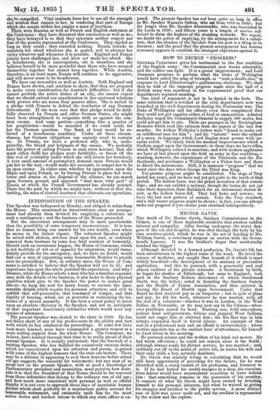INDISPOSITION OF THE SPEAKER.
THE Speaker was indisposed on Monday, and obliged to retire from the House. This occasioned no inconvenience, since an arrange- ment had already been devised for supplying a substitute on such a contingency ; and the business of the House proceeded.
But the convenient arrangement may be more questionable than the possibility of some temporary inconvenience. It is true that no human being can answer for his own health, even when he seems in the fullest vigour. The robustest Speaker might be seized with cholera, stricken dead upon his seat, or suddenly removed from business by some less fatal accident of humanity. Should such an occurrence happen, the House of Commons, which is not destitute of wit or of capacity for adaptation, would imme- diately provide for the emergency, and, we have no doubt, would find out a way of appointing some honourable Member to preside over its proceedings. But, in ordinary eases, the House of Com-- mons is satisfied to believe that the Speaker will not be ill ; and experience has upon the whole justified the expectation. And why P Because, while the House selects a man who has a familiar acquaint. ance with the details of its business, it also looks to those physical qualities which give to the Speaker the power to endure great labour—to keep his seat for many hours, to oversee the innu- merable details which require his personal attention, and still to exhibit that self-possession, that command of temper, and that dignity of bearing, which are so powerful in restraining the hu- mours of a mixed assembly. It has been a sound policy to insist upon an absolute efficiency in the Speaker, and not to anticipate in that important functionary infirmities which would need any species of allowance.
The present Speaker was elected to the chair in 1839. He has not fallen short of any of his predecessors in the ability and tact with which he has conducted-the proceedings. If some few have been more learned, none have commanded a greater respect or a more willing support from the whole House. The Commons, we believe, have learned through that time to be really proud of their present Speaker. It is usually understood, that the farewell of a retiring Speaker, who has fulfilled the excessively onerous duties which are concentrated upon his attention and person, is graced with some of the highest honours that the state can bestow. There may be a delicacy in appearing to seek those honours before actual old age suggests the necessity for retirement; but any man of so much tact as the present Speaker, with so good a knowledge of Parliamentary precedent and necessities, must perceive how desir- able it is that the President of that House should be far removed
from those infirmities that belong to the ordinary run of old age; and how much more consistent with personal as well as official
dignity it is not even to approach those days of inevitable human decline which shall perfectly fit a meritorious public servant for honourable retirement, and eminently unfit him for the most
active duties and hardest labour to which any state officer is ex- by the widow and the orphan.
posed. The present Speaker has not been quite so long in office as Mr. Speaker Manners Sutton, who sat from 1818 to 1835; but far longer than Mr. Speaker Abercrombie, who was translated to the Lords in 1839 ; and fifteen years is a length of service suf- ficient to claim the highest of the standing rewards. We repeat, we doubt the policy of implying, by the arrangement for a substi- tute, that the absence of the Speaker from his post is a thing to be foreseen ; and the proof that the present arrangement has become necessary appears to establish the strongest objections against it.


























 Previous page
Previous page